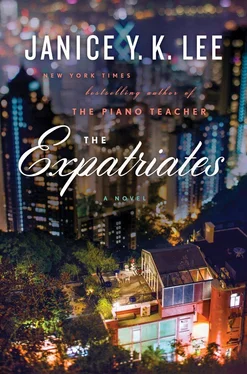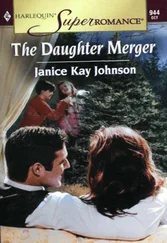She and Clarke had drinks with the Starrs during the trip but didn’t really keep up afterward in Hong Kong, and then it became a little awkward when they saw each other in town, or at parties, as they had both accepted they wouldn’t go any further with the friendship. But then after what happened, a phone call. Hilary called to say how sorry she was about G and wanted to see her. They had lunch, and now they had a passing sort of friendship where they saw each other and made polite noises about doing it again and sometimes coming through.
So, tonight.
She cleans up her snack and gets ready to leave.
Back at home, Clarke has returned early, is there before her. He kisses her.
“Good day?” he asks.
“Yes,” she says. They are still always careful around each other. She wonders when that will end, if ever. They’ve both read the literature — the majority of marriages break up after the death of a child or something like what’s happened to them. It’s too painful. But they have the other kids, and the memory of what it used to be like. Maybe that is enough.
“We have that dinner,” she says. Before, she would call his assistant and have her remind him, or send an e-mail, but she never bothers anymore.
“Yes, it’s on my calendar,” he says. “David and Hilary.”
“Right.”
Clarke gets along with everyone, but they both don’t love David. Hilary is fine.
They both remember when they first met them together, on that trip to Thailand. There was a New Year’s Eve party at the resort, and after the children went to bed, things got a bit wild, with a lot of drinking and middle-aged people going crazy on the easily available drugs. David was on something and started grinding with some man. It wasn’t even that she thought David was gay or that she cared; it was just a little factoid about him that she kept with her. Just a little thought bubble in her head when she saw him put a jacket over his wife’s shoulders as they left a party or if she saw him swimming at the club. It was not unkind, more of a “people contain multitudes within them” feeling.
They kiss Daisy and Philip good night. Their children sit, watching a movie, as Essie reads a book next to them. This used to be one of her favorite moments in life, leaving clean, fed, contented children behind as she and her husband went out to enjoy each other, but now nothing is easy, nothing is pleasurable. She can’t let it be — it would feel like a betrayal. How can she be sitting in an air-conditioned restaurant in a comfortable chair enjoying a grilled fish and a glass of wine, or lying on a beach chair with a good book, while G might be starving or worse in some barn in rural Korea? How can she let herself?
They drive to the Starrs’ in silence. It is only fifteen minutes away, but she lets herself think that the silence is a friendly one, nonreproaching, comfortable. She touches Clarke’s cheek while he is driving, wonders what he is thinking. He looks over at her and smiles. They have learned to do with so much less.
At the Starrs’, everything is perfect, the house warm and inviting with scented candles, lamps giving off muted light, jazz playing softly. Hilary achieves this by being stringent in everything in her life, from her diet to her house. There’s the usual mix: South Side investment bankers and regional company heads and Mid-Levels ad execs and their wives, all American. When she first moved to Hong Kong, she thought she might make friends with the different nationalities she saw all around her. Her children’s friends were Danish, Japanese, local Hong Kong. But after a few strained meals, she saw how it was easier to stay with your kind. So, although she loathed the concept, she embraced the reality and became friends with the same people she would have known back in America.
She accepts a drink from the smiling bartender and turns to talk to a couple who are visiting from California, faces starry with jet lag.
“You’re from San Francisco,” she says politely. And the conversation starts. Another night in Repulse Bay.
AN ODD MIX that never gelled. The Reades, whom everyone knew. Poor Margaret. They were trying to live, but how could they? She seemed tentative all the time now, as if she was trying to lead a normal life but had forgotten how. Hilary had never seen her cry, but she imagined that she must cry all the time. And the new couple, who were moving here. The wife, what was her name? Molly? She was asking about tennis, so she might be an addition to Hilary’s team. She would e-mail her about it.
Then the couple from out of town, David’s college buddy, who was the most boring person she had ever met. She sat him next to her, because he was the visitor (and, of course, the newcomer was on her other side), but he tried to talk to her about basketball, and she had been so bored.
She lies in bed, thinking about what transpired at the dinner. Nothing, really. Just the usual talk about children and families and where people were going for the upcoming holidays. It turned out that the Reades were going to Phuket the next day and coming back via Bangkok, and they would overlap with her in Bangkok when she was there with her mother. So they’d made plans to get together. Her mother would be glad to see Margaret. And all this not to think about the fact that David has disappeared. He said he wanted to go out with his friend, but the wife gave his friend the stink eye, and they declared they were going to hit the sack — jet lag and all. But David insisted, said he was meeting someone afterward. She was pointedly not invited, so she pretended she knew and was okay with it.
So here she is, lying in her bed, with an almost empty glass of wine on the bedside table, teeth freshly flossed, Bio-Oil glistening unattractively on her face, slubby pink floral pajamas. Hardly a temptress who knows how to keep her man, let alone bring a child into her world.
Because, of course, that’s what Olivia wanted to talk to her about. Hilary’s not an idiot. She knows, little bit by little bit, that David has changed here in Hong Kong. He is absent from her because he works so much and she has less and less to do with his life. She doesn’t know what his life is like when he leaves home, and home is where he spends two or three awake hours, max, getting into bed at night, showering in the morning. He’s been staying out later, smelling of booze when he gets home. (Oh, the irony! They could be drinking together.) Being evasive about where he’s been. It’s not like he is actively doing something wrong, like having an affair or nurturing a drug habit, but he is on the verge of tipping over. She can sense it. Olivia may not have seen him actually with some girl, but he’s probably been seen in bars in the company of other women, without his wife present, without a chaperone. There, that sounds about right, in a Jane Austen version of the world. Disporting himself inappropriately.
This is the Hong Kong curse that expat housewives talk about in hushed voices: the man who takes to Hong Kong the wrong way. He moves from an egalitarian American society, where he’s supposed to take out the trash every day and help with the dinner dishes, to a place where women cater to his every desire — a secretary who anticipates his needs before he does, a servant in the house who brings him his espresso just the way he likes it and irons his boxers and his socks — and the local population is not as sassy with the comebacks as where he came from, so, of course, he then looks for that in every corner of his life. The rental buildings are littered with the ghosts of ruined marriages: a husband who left his wife and kids for his assistant, an ebony-tressed Chinese sylph who is already pregnant; a man who was lost to the seedy, red-light pleasures of Wan Chai and the paid hostesses who found his every utterance completely fascinating, or sometimes to a more interesting, engaged female colleague, a welcome relief from the woman he faces at home, complaining about his travel, his schedule, his lack of time with the kids. So why not change it up? Why not trade up? Or down, and have some fun?
Читать дальше












